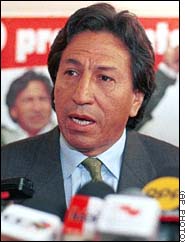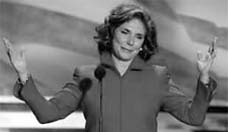
Spare a moment's sympathy for Toledo. He won his presidency three years ago on a platform that promised an end to Peru's endemic corruption. Now the corruption allegations swirling around his office — though fiercely denied — have got some pundits calling him "Latin America's least popular president."
Rhetoric exposes U.N. hypocrisy
STEPHEN HANDELMAN
`What we say here," President Alejandro Toledo of Peru advised at the United Nations last week, "needs to be connected to the real world."
Spare a moment's sympathy for Toledo. He won his presidency three years ago on a platform that promised an end to Peru's endemic corruption. Now the corruption allegations swirling around his office — though fiercely denied — have got some pundits calling him "Latin America's least popular president."
But he seemed oblivious to that as he joined the annual fall parade of leaders addressing the U.N. General Assembly. On the theory that the best defence is a good offence, he used a press conference to appeal for international support for Peru's efforts to extradite his predecessor Alberto Fujimori from Japan to face corruption charges at home.
And that's when he made his intriguing point that national leaders who are given the privilege of the extraordinary U.N. podium need to set an example to the world in their own conduct.
If only we could believe they were listening.
This year's gathering offered a stark glimpse of the real divide in the world today. Not the ones portrayed in the headlines, such as the rifts over terrorism policy, or between much of the world and President George Bush.
It's between those who respect laws — or value legal obligations — and those who don't.
Bush is easy to criticize — obviously many have — for a foreign policy doctrine that runs roughshod over the concepts of multilateralism, which underpins the U.N. and its efforts to break new ground in international law.
We're not talking about Iraq here, but about, for instance, the International Criminal Court or improving the Biological Weapons Convention, both of which Washington has opposed.
Okay, but what about those other leaders who also used the podium to lecture the world on righteousness, while ignoring their domestic sins?
Best example of that last week was Robert Mugabe, Zimbabwe's president, whose regime is condemned around the world for harassing opposition parties, intimidating the press and using violence to undermine democracy.
Did Mugabe bother to acknowledge that? Not a chance.
Instead, he got a smattering of unparliamentary applause for his tirade against Washington and its allies for pursuing a "new political-cum-religious doctrine" in which "there is but one political god, George W. Bush, and Tony Blair is his prophet."
Great line, but no one laughed at the next one, in which he called the U.N. Charter "the most sacred document and proponent of relations of our nations."
That's the same document whose preamble commits member states "to reaffirm faith in fundamental human rights, in the dignity and worth of the human person, in the equal rights of men and women and of nations large and small."
U.N. Secretary-General Kofi Annan tried to bring the debate down to reality. He was widely quoted for his apparent criticism of the U.S. venture in Iraq, noting "every nation that proclaims the rule of law at home must respect it abroad."
Less widely noted was his second line: "And every nation that insists on it abroad must enforce it at home."
The General Assembly debates are a yearly ritual of international diplomacy. And the ritual requires everyone to listen politely, if they listen at all.
These speeches, after all, are largely aimed at impressing an audience at home with the leader's ability to rub shoulders with powerful states and, if necessary, tell them off.
Brazil's President Luiz Inacio Lula da Silva railed against the "powerful and all-encompassing cogwheel" that runs the world system. Venezuela's Hugo Chavez condemned the "unjust, exploitative and unsustainable world economic order."
But it would be nice if leaders understood — as Toledo said — that even the most stirring rhetoric has to be measured against actions.
South Africa's Thabo Mbeki put his finger on the problem. "Every year many of us ... make an annual pilgrimage to this great and vibrant city to plead the cause of the poor of the world, hopeful that this time our voices will be heard," he said in his address.
"Every year, after a few days, we pick up our bags to return to the reality of our societies, whose squalor stands out in sharp contrast to the splendour of New York."
He's right, but the solution to the growing global gap between rhetoric and "reality" doesn't always lie in concentrating on the world's dark geopolitical forces.
It has a lot to do with setting an example of good, responsible, and honest government at home.
Stephen Handelman appears every second Tuesday.



